#pyrrhus of epirus
Text

Fabricius and Pyrrhus, Ferdinand Bol, 1656
#art#art history#Ferdinand Bol#historical painting#ancient history#Ancient Rome#Roman history#Roman Republic#Hellenistic history#Pyrrhus of Epirus#allegory#allegorical art#Dutch Golden Age#Baroque#Baroque art#Dutch Baroque#Dutch art#17th century art#oil on canvas#Royal Palace of Amsterdam
75 notes
·
View notes
Text
A classic Greek vs Roman situation
#agathocles#greeks vs romans#roman history#greek history#syracuse#sicily#archimedes#greek tyrants#greek tumblr#roman tumblr#italian tumblr#sicilian#king of Sicily#sextus can sext us#sextus pompey#Sextus Pompeius#pompey the great#punic wars#carthage#greece#magna graecia#greater greece#pyrrhus#pyrrhus of epirus#pyrrhic victory#pyrrhic#Pompeius magnus#gnaeus pompey#pompeius#gnaeus pompeius magnus
7 notes
·
View notes
Text

Something awakening in the son of Achillies and the son of Agamemnon
#tagamemnon#greek mythology#classics#greek heroes#ancient greek mythology#post the fall of troy#the iliad#the oresteia#this is silly#pyrrhus of skyros#pyrrhus#pyrrhus of epirus#pyrrhus x orestes#orestes#Achillies#agamemnon#orestes and pyrrhus#gay#epirus gang
4 notes
·
View notes
Text
youtube
Despotate of Epirus.
A rugged and mountainous region, Epirus was the north-west area of ancient Greece. It was inhabited by the Greek tribes of the Chaonians, Molossians, and Thesprotians. It was home to the sanctuary of Dodona, the oldest oracle in ancient Greece, and the second most prestigious after Delphi. Unified into a single state in 370 BC by the Aeacidae dynasty, Epirus achieved fame during the reign of Pyrrhus of Epirus who fought the Roman Republic in a series of campaigns. Epirus subsequently became part of the Roman Republic along with the rest of Greece in 146 BC, which was followed by the Roman Empire and Eastern Roman Empire. Following the fall of Constantinople to the Fourth Crusade, Epirus became the center of the Despotate of Epirus, one of the successor states to the Byzantine Empire.
#music#farya faraji#byzantine music#epirus#ancient greece#pyrrhus of epirus#eastern roman empire#despotate of epirus#greece#albania
1 note
·
View note
Note
Do you perhaps remember in school where they taught us about women throwing pots from their balconies to prevent their soldiers from coming to their city? I don't remember if it was during the Peloponnese war or somewhere different, but i remember we were laughing in class when the teacher was describing us this scene. 😅
Their soldiers? I know about enemies. This was a must in every Greek school history lesson but why can't I find it anywhere on the Internet????? The only relevant thing I found was when King Pyrrhus was killed by a woman throwing a brick at him from her rooftop in the Battle of Argos. (The Battle of Argos took place in 272 BC and was fought by King Pyrrhus of Epirus - who was trying to expand his influence in the Peloponnese - against Argos, Sparta and Macedonia.)
But the general tendency of women to throw stuff from their rooftops honestly is mentioned so often at school that I don't know why I can't find more info online right now...
34 notes
·
View notes
Text
Fantasy character: "After the adrenaline wore off..."
Me: This fantasy world has knowledge of the endocrine system!
Fantasy character: "It was a pyrrhic victory..."
Me: This fantasy world had a Pyrrhus I of Epirus!
Fantasy character: "She was dressed in a kind of elvensilk onesie..."
Me: This fantasy world has a Gerber corporation!
2K notes
·
View notes
Text
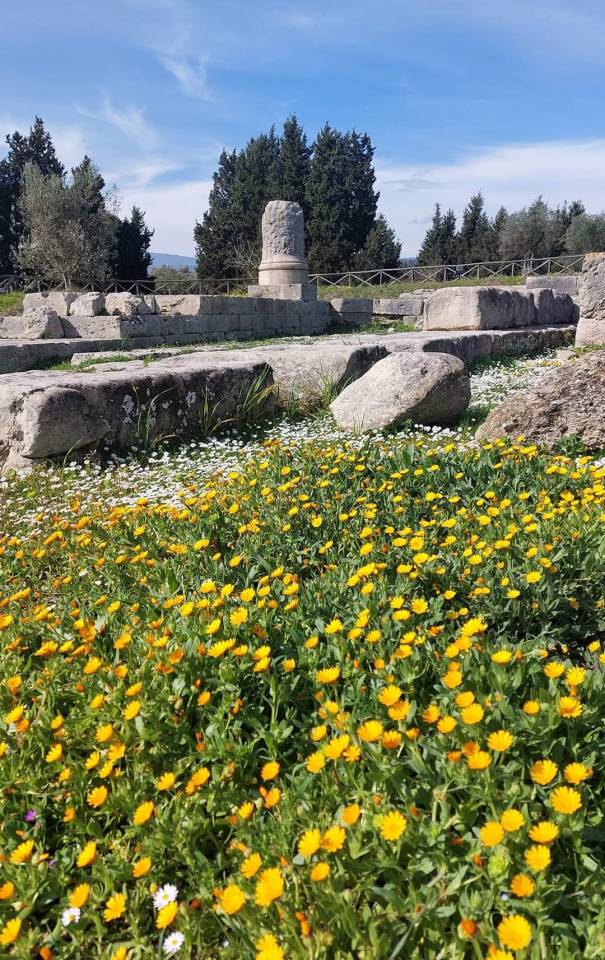

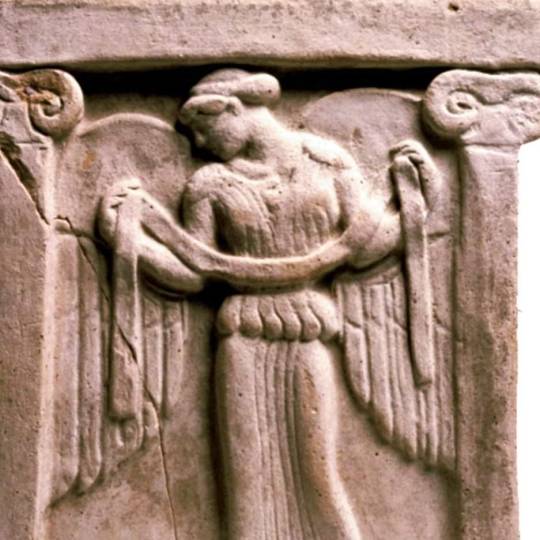
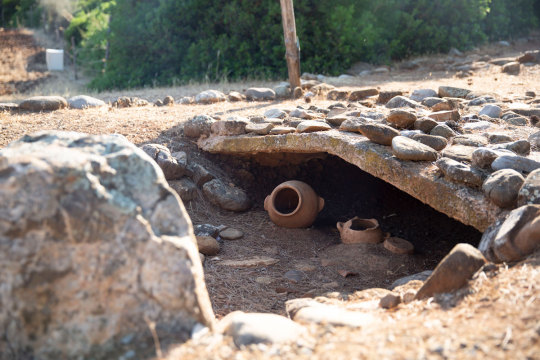
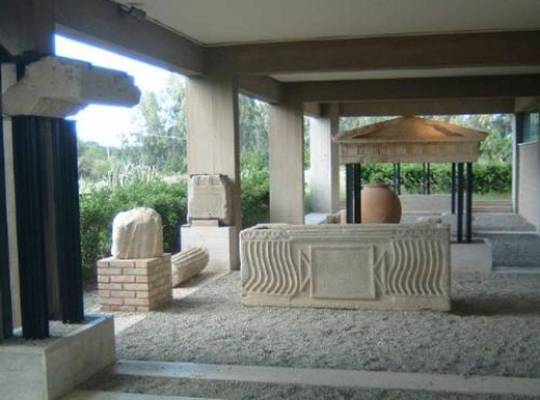
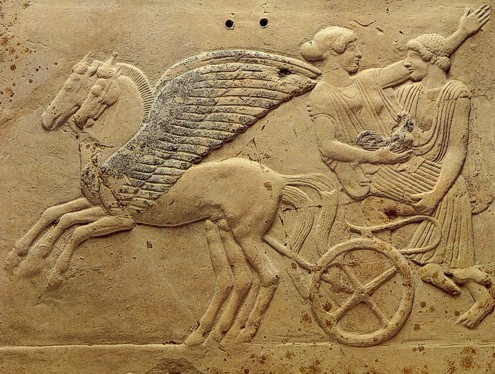

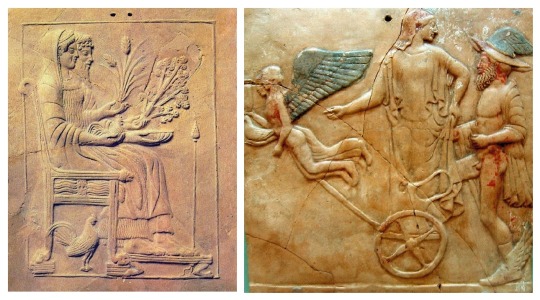
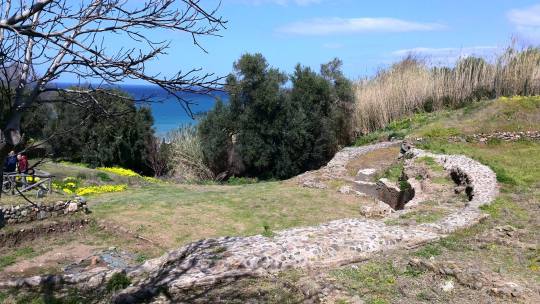

Locri, Calabria, Italy
Locri Epizefiri (Greek Λοκροί Ἐπιζεφύριοι; from the plural of Λοκρός, Lokros, "a Locrian" and ἐπί epi, "on", Ζέφυρος (Zephyros), West Wind, thus "The Western Locrians") was founded about 680 BC on the Italian shore of the Ionian Sea, near modern Capo Zefirio, in Southern Italy's Calabria, by the Locrians, apparently by Opuntii (East Locrians) from the city of Opus, but including Ozolae (West Locrians) and Lacedaemonians.
Due to fierce winds at an original settlement, the settlers moved to the present site. After a century, a defensive wall was built. Outside the city there are several necropoleis, some of which are very large.
Locris was the site of two great sanctuaries, that of Persephone and of Aphrodite. Perhaps uniquely, Persephone was worshiped as protector of marriage and childbirth, a role usually assumed by Hera, and Diodorus Siculus knew the temple there as the most illustrious in Italy.
In the early centuries Locris was allied with Sparta, and later with Syracuse. It founded two colonies of its own, Hipponion and Medma.
During the 5th century BC, votive pinakes in terracotta were often dedicated as offerings to the goddess, made in series and painted with bright colors, animated by scenes connected to the myth of Persephone. Many of these pinakes are now on display in the National Museum of Magna Græcia in Reggio Calabria. Locrian pinakes represent one of the most significant categories of objects from Magna Graecia, both as documents of religious practice and as works of art. In the iconography of votive plaques at Locri, her abduction and marriage to Hades served as an emblem of the marital state, children at Locri were dedicated to Persephone, and maidens about to be wed brought their peplos to be blessed.
During the Pyrrhic Wars (280-275 BC) fought between Pyrrhus of Epirus and Rome, Locris accepted a Roman garrison and fought against the Epirote king. However, the city changed sides numerous times during the war. Bronze tablets from the treasury of its Olympeum, a temple to Zeus, record payments to a 'king', generally thought to be Pyrrhus. Despite this, Pyrrhus plundered the temple of Persephone at Locris before his return to Epirus, an event which would live on in the memory of the Greeks of Italy. At the end of the war, perhaps to allay fears about its loyalty, Locris minted coins depicting a seated Rome being crowned by 'Pistis', a goddess personifying good faith and loyalty, and returned to the Roman fold.
The city was abandoned in the 5th century AD. The town was finally destroyed by the Saracens in 915. The survivors fled inland about 10 kilometres (6 mi) to the town Gerace on the slopes of the Aspromonte.
Today, the modern town of Locri boasts a National Museum and an Archaeological Park, etirely dedicated to the ancient Greek city. The museum preserves the most important findings of the time, such as vases, pinakes, tools used in everyday life, architectural remains from the various excavation area.
Follow us on Instagram, @calabria_mediterranea
#locri#calabria#italy#italia#south italy#southern italy#mediterranean#mediterranean sea#magna graecia#magna grecia#archaeology#archeology#ancient#art#ancient art#history#ancient history#greek#greek art#ancient greece#landscape#italian#italian landscape#landscapes#europe#persephone#olive trees#olive tree#nature#nature photography
72 notes
·
View notes
Text
I'm not over how Pyrrhus of Epirus died.
A famous and very capable warrior king who, in the middle of a disastrous battle inside a city, was battling a random soldier whose name is not even known.
And then the soldier's worried mother, who was watching the battle from the rooftops, threw a roof tile at Pyrrhus. She not only hit him but also knocked him off his horse and broke his spine.
28 notes
·
View notes
Text
omg kanye is going for a Pyrrhus of Epirus (319/318–272 BC) inspired look...


"He was short of teeth, in the sense that his upper jaw was one continuous bone, with faint creases marking where gaps should have been"
24 notes
·
View notes
Text
Pyrrhus of Epirus is so funny. Imagine being such a cringefail general that 22 centuries later people still invoke your name to signify absolutely unacceptable loses
6 notes
·
View notes
Text
Pyrrha Dve and Pyrrha of Thessaly: Survivors of the Flood
“If I’m God, I can start over. The flood, you know? You can wash things clean. That’s all the end of Earth was … making things clean.” --Nona the Ninth, p. 435
“You want Gideon the First, and Gideon the First is dead. He’s not coming back. Oh, God, Gideon,” said Pyrrha, suddenly. “Gideon … G—, you died for nothing.” --Nona the Ninth, p. 390
tl;dr: Pyrrha Dve shares a name with Pyrrha of Thessaly, one of the only two survivors of Zeus’s great deluge in Greek myth, which might connect to why Pyrrha alone seems to remember G1deon’s real name from before Jod’s “flood.” Unpacking this allusion brings to light other suggestive parallels between the two Pyrrhas’ stories, including:
Zeus and Jod’s destruction of the Earth with the intent to replace flawed humanity with a new, pious version of humankind who would worship them as gods
how the Greek Pyrrha survives without Zeus’s knowledge by hiding in her husband’s “chest” (sound like someone we know?)
Pyrrha of Thessaly’s role in repopulating Earth by disturbing her “mother” Gaia’s grave and casting her bones (aka stones) to the ground, from which arose the new human beings (who else disturbs “Earth’s” Tomb?)
and some other more out-there parallels, including a connection to the tower in the River; some thoughts on Zeus, Jod, and cannibalism; a verrrry tangential connection between Pyrrha and Gideon Nav; and thoughts on other survivors
So, following the release of Nona the Ninth, we’re now all familiar with Jod’s conception of the end of the Earth as a literalization of the flood myth with him as God. Afterwards, he claims he brought back all his friends without their memories – and, based on his discussion of renaming Ulysses and Titania and the fact that the Lyctors’ old names are all dashed out, many of us have assumed with new names. But somehow, Pyrrha Dve seems to remember her necromancer’s original name. What’s going on with that?
I don’t have an explanation, but I do have a very interesting parallel, which is almost entirely not the same thing while still justifying writing meta! :P (I mean, if you’re looking for an explanation, my best guess is that Jod talks about altering memory through changing the brain’s biological structures, suggesting that the soul still remains a blind spot of his. Pyrrha no longer has her physical corporation/brain and is solely existing in Gideon’s body, so maybe there’s something there? Soul memories, idk lol.)
Lots of past meta I’ve seen about Pyrrha Dve’s name has focused on Pyrrhus of Epirus, who gave his name to the term “Pyrrhic victory”: a victory whose losses were so severe as to call into question whether such a “victory” was really worth it at all. On that reading, Pyrrha’s name is a nod to how attaining Lyctorhood was a Pyrrhic victory for Gideon and the other Lyctors, because they had to sacrifice their most beloved companions (brother, wife, best friend, etc.) to achieve this “lesser”/imperfect Lyctorhood. I’ve also definitely seen people point out how the name Pyrrha itself comes from the Greek adjective “πυρρός”, which can mean flame-colored or redheaded: clearly apt for our girl/my wife Pyrrha. I think all of that is right, and also I think tazmuir was drawing on yet another mythological parallel for Pyrrha’s name: that of Pyrrha of Thessaly, survivor of the Flood.
Pyrrha of Thessaly and Pyrrha Dve
In Greek myth (well, more or less, depending on the version – I’m quoting Dryden’s Ovid here, so Roman reception, but I’ll stick with Zeus to make things easier), Zeus decides to wipe the Earth clean after judging humanity irredeemable. When he shares this plan, the other gods immediately complain that, should he destroy humankind, “Neglected altars must no longer smoke,/If none were left to worship, and invoke.” Interestingly, he immediately reassures them: “Lay that unnecessary fear aside:/Mine be the care, new people to provide./I will from wondrous principles ordain/A race unlike the first, and try my skill again.” In other words, after the cleansing flood, he’s going to create a new crop humanity to worship him and his pantheon at those neglected altars … sound like anyone we know yet?
However! Two humans survive Zeus’s deluge: Deucalion, ruler of Phthia in Thessaly, and his wife Pyrrha. Here’s where it gets especially intriguing, because depending on the version you read, this Greek Noah and his wife survive for different reasons! Ovid’s Metamorphoses has them surviving because they’re the two best people around – the most holy, upright, worthy, etc. But in other accounts, such as that in the Bibliotheca of Pseudo-Apollodorus, they actually sort of sneak past Zeus. Deucalion’s father is the Titan Prometheus (whom you may remember from other Zeus-defying escapades like “giving humanity fire”), and Prometheus instructs Deucalion on how to build and provision a chest that will survive the flood. Thus, when Zeus goes to destroy humanity, Pyrrha survives inside Deucalion’s chest until the flood ends and the two reach dry land and propitiate Zeus. (OK, so it’s an actual physical wooden trunk, BUT ALSO Pyrrha survives by hiding in her husband’s chest I’m just saying.)
After surviving, the two ask the gods (usually Zeus through an intermediary) how to repopulate the planet. They are told to “throw … your mighty mother’s bones” to the ground – a suggestion that horrifies Pyrrha, who refuses to defile her mother’s grave, crying out, “Forbid it Heav’n, said she, that I shou’d tear/Those holy reliques from the sepulcher” (we’re back to quoting Ovid here btw). But after carefully pondering their instructions, they find a different meaning: perhaps, Deucalion suggests, “This Earth our mighty mother is, the stones/In her capacious body, are her bones.” So they gather up “Gaia’s bones”, i.e. rocks from the ground, and when they cast those stones behind them, new human beings spring up from where they fall.
Pyrrha’s calling Gaia her mother, her disturbing Gaia’s remains from their “sepulcher,” and Gaia’s “bones” repopulating the Earth are all very interesting! It probably goes without saying that there’s a Gaia-Alecto connection here (in fact, I think you could even say John makes that connection fully textual when he calls himself John Gaius, if you read it as a Lyctoral name). I read the Greek Pyrrha’s identifying Gaia as her mother as a neat inversion of the parental relationship between Pyrrha and Nona (note that in the myth, Gaia isn’t Pyrrha’s actual mother – that’s Pandora, while her dad is Prometheus’s brother, Epimetheus (which technically makes Gaia her paternal great-grandmother)). Our Pyrrha is, obviously, involved in unearthing (heh) Alecto’s body from the Tomb, just as the Greek Pyrrha felt she was being called to disturb her mother/Gaia’s resting place.
Alecto the Ninth Speculation: Gaia’s Bones and the Resurrection
All of the above I think is reasonably textually supported, but with the last “parallel” – the repopulation of the planet from Gaia’s bones – I’m going to step off the deep end, lol, and move away from literary analysis of existing parts of TLT to pure speculation about the future. First off, the key caveat is that, obviously, I don’t think Tamsyn Muir is trying to write a literal beat for beat version of the Greek flood myth with Pyrrha Dve, so I think the actual likeliest explanation here is that the actual limit of Pyrrha Dve’s connection to Pyrrha of Thessaly is just that both (sort of) survived their respective divine “floods.” But I do have a couple thoughts about directions that “Gaia’s bones” and the resurrection could point at, which I’ll list roughly from most to least likely; and I’m also interested in hearing others’ ideas.
I think this parallel could pay off in one of two directions: either the Resurrection in the past or something in the future, in Alecto, involving a collaboration between Nona/Alecto and Pyrrha. In the past, we obviously don’t know yet how the Resurrection actually went – John’s confession in Harrow’s Alecto-dreams didn’t extend that far – but it’s easier to speculate (and to pick out speculative parallels). It certainly seems apparent that Jod’s going to be majorly drawing on Alecto’s power to do it – just as Zeus claimed he was creating a whole new crop of humanity to worship him, but was actually digging up Gaia’s bones to make the magic happen. Making bodies from earth and stones is a classic mythic motif, so I don’t think the Pyrrha flood myth is necessarily being referenced here, but there sure is something neat about John’s making Alecto’s body “from the dirt, my blood, my vomit, my bone.” Beyond that, some versions of the Greek flood myth suggest that humanity’s nature was changed by being reborn from stones, with Ovid writing, “Hence we derive our nature; born to bear/Laborious life; and harden’d into care” (the Greeks were generally huge fans of the pun possibilities between λαός (people) and λᾶας (stone)). You could maybe connect that to the suggestion that there seems to be something slightly off in Jod’s new version of people – the sickliness that affects necromancers? (I don’t think that’s quite right, though, because you’d expect stones to be harder, not brittler and easier to break.)
But the myth isn’t just about how Zeus uses Gaia’s bones to resurrect humanity – it’s also about how Pyrrha and her partner (Deucalion/G1deon) bring back humanity. Maybe the importance of Deucalion in revitalizing humanity via Gaia could pay off if it turns out G1deon has a key role in the Resurrection (Jod keeps talking about how he has “big plans” for Gideon’s arm, and he even says that “G—’ll be easiest” to bring back, although in context I think he just means that he won’t have to wipe as much of his memory because he wasn’t even at the compound)? I think that’s a reach, though, and that the arm is just important so he has biomaterial on hand (lol). But the reachiest possible connection here is to say that maybe Pyrrha’s going to play a role in some future Resurrection: something in Alecto the Ninth that resolves Jod’s “missing math” (the people he didn’t bring back, possibly the souls clogging up the river?) and brings more people back, or brings back people “correctly.” Certainly, in terms of any role Pyrrha could play in collaborating with Alecto/Gaia in something like a resurrection or rebirth of humanity in the next novel, it’s worth noting that she is now strongest remaining link from Alecto back to Nona, with all of Nona’s compassion and love.
Remaining Errata
OK, that’s all for immediate parallels from the meat of the Greek flood myth! But there are some remaining pieces of the myth that caught my attention, so those get to go at the end of this piece of meta.
The Tower
Whatever’s going on with the massive new Tower in the River is obviously going to be important! I have a LOT of thoughts about this, but that is for another meta. What I’ll say here is that, while I think the clearest reference there is to the Tower of Babel (what with Nona being the only person who can still understand all languages), another famous mytho-religious tower-y structure often identified with the Tower of Babel is the towering pile of mountains that the Greek Giants built to reach the gods when they tried to challenge Zeus et al. Per Ovid, observing the Giants’ building this tower was one of the things that made Zeus despair at the current state of the world and decide to set off the flood that Pyrrha survived in the first place.
Cannibalism
Other reasons Zeus was angry enough to flood the earth: eating human flesh! One of the impieties that drove Zeus to damn the first version of humanity was King Lycaon daring to test whether Zeus was truly omnipotent by serving him human flesh. Go on, dive in, I know y’all are thinking of that bit in Harrow where Jod says, “Ten thousand years since I’ve eaten human being, Harrow, and I didn’t really want an encore.”
Gideon Nav as Pyrrha Dve’s Achilles?
Finally, Phthia, which Deucalion and Pyrrha ruled, was later Achilles’s home. You could possibly say something here about our Pyrrha and G1deon as not-parents to Gideon, who ~invaded~ the planet of Priamhark Noniusvianus, just as Achilles invaded the city of Priam in the Trojan War. I think that’s probably squinting too hard, buttttt you could still make the case. Also, that takes us full circle back to the other Pyrrhus that Pyrrha could be named for, because Plutarch seems to suggest that Pyrrhus (he of the Pyrrhic victory) got his name from family tradition because Deucalion and Pyrrha were the first rulers after the flood in Epirus.
Other Flood survivors?
OK, I have no idea what to do with this piece, but obviously Pyrrha isn’t the only potential “survivor” of Jod’s “flood” – the fleeing trillionaires (or potentially other human outposts?), etc. Similarly, some versions of the Greek flood myth suggest that in addition to Pyrrha and Deucalion, a few other humans slip through, such as Cerambus, grandson of Poseidon. This seems kind of tangential, but hey, if someone named “Cerambus” shows up in AtN and seems to know a lot about Earth without Jod’s blessing, we should probably listen to him! ;)
Sources
Ovid’s Metamorphoses
The Pseudo-Apollodorus
Other Greek and Roman flood accounts overview
Pyrrha and Deucalion in Greek and Roman writing
On Pyrrha, Deucalion, stones, and puns
#tlt meta#pyrrha dve#john gaius#nona the nonth#alecto the ninth#gideon the first#alecto the first#nona#alecto speculation#nona the ninth spoilers#ntn spoilers#the locked tomb#the locked tomb meta#meta#pyrrha of thessaly#i have no idea what else to tag this. huh.#locked tomb
143 notes
·
View notes
Text
A Plutarchian Woodcut Wednesday
We’re spending our Woodcut Wednesday with this stunning sixteenth-century edition of Plutarch’s classic Parallel Lives featuring the work of artists Jost Amman and Tobias Stimmer.

The allegory of Fama, otherwise known as Fame or Renown, by Tobias Stimmer opens Plutarch’s Parallel Lives on the title page.

Various scenes from the life of the legendary Athenian monarch Theseus, including the hunt of the Calydonian boar and the hero throwing Sciron off a cliff edge. Plutarch pairs the Greek Theseus with the Roman Romulus.

The founding of the city of Rome under Romulus. The murder depicted in the foreground could be Romulus slaying Remus in the dispute over where Rome ought to be built.
Plutarch (ca. 46-after 120 A.D.) was born under Roman rule in Chaeronea, Boeotia, to a wealthy and established Greek family. Plutarch traveled to Athens in the mid-60s to study a variety of subjects, including medicine, physics, Latin, and philosophy. Though they were technically the conquering rulers, Romans at the time valued their Greek subjects’ culture of learning, and Plutarch was among those invited to tour Italy as a lecturer. Plutarch’s moral and philosophical lessons enjoyed success and formed the basis of his later written works. Parallel Lives was penned towards the end of Plutarch’s life when he had returned to Greece and was serving as a statesman and head priest of Apollo.

The unfortunate demise of the scholar Archimedes at the hands of Marcellus’ forces as they sack Syracuse. Plutarch relates that Marcellus’ greatest regret was the death of the famous mathematician.
Parallel Lives (Gk., Bioi paralleloi) is a moralistic set of biographies that examines the lives of notable Greek men and their Roman counterparts. The biographies are moralistic in the sense that Plutarch did not intend to write historically accurate accounts but rather wanted to draw out the lessons to be learned from the examples, both good and bad, of the lives of famous Greek and Roman individuals. Parallel Lives had a profound influence on readers from Plutarch’s contemporaries in the Roman Empire up through to the Middle Ages and early Renaissance. For example, William Shakespeare drew heavily on Plutarch’s Parallel Lives to write the plays Coriolanus, Timon of Athens, Antony and Cleopatra, and Julius Caesar.

Coriolanus and his forces, in the Volscian camp, hear the pleas of his mother, wife, and the women of Rome to stop his attack on the city. Coriolanus relents and the women are later honored with the building of a temple to the goddess Fortuna.
The edition of Parallel Lives featured in this post was printed by Frankfurt am Main publisher Sigmund Feyerabend (1528-1590) in 1580. The text is the Latin translation of Heidelberg University scholar Wilhelm Xylander (1532-1576), who famously produced the first Latin translation of Marcus Aurelius’ Meditations. The woodcut illustrations are the work of the prolific Swiss-German artist Jost Amman (1539-1591) and Swiss painter Tobias Stimmer (1539-1584). As an interesting sidenote, several of the woodcuts appearing in this edition of Plutarch were recycled from Feyerabend’s 1568 edition of Livy’s History of Rome.
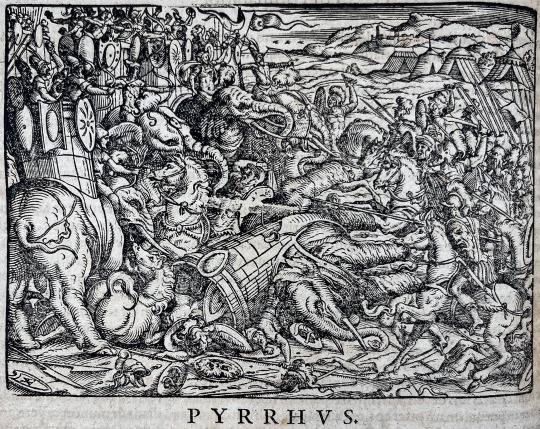
Battle between two armies, one on horseback and the other on war elephants. This generic illustration is repeated for Plutarch’s Life of Alexander (the Great) and Life of Pyrrhus (of Epirus). The former famously fought against forces that used elephants; the latter notably used them in battle.

As a change of pace from all the foregoing imagery of bloodshed and gore, we'd like to end with this elaborate woodcut of Aristotle seated at a table of scholars. Aristotle is not among the lives covered in the Bioi paralleloi, but this edition adds a brief biography of the philosopher by Guarino Veronese.
Images from: Plutarch. Vitae illustrium vivorum Graecorum et Romanorum. Frankfurt am Main: Sigmund Feyerabend, 1580. Catalog record: https://bit.ly/3DUnWhl
61 notes
·
View notes
Text

Final piece for 2022! A snow piece of Pyrrhus and Hermione, not sure if it would truly snow that much in Epirus but I can dream
#my art#log's art#logs art#the iliad#greek mythology#classics#pyrrhus#neoptolemus#hermione#hermione myth#hermione of sparta#tagamemnon
27 notes
·
View notes
Text

When Chaon had to be sacrificed. Who did the Sacrificing
#tagamemnon#ancient greek mythology#greek myth art#chaon of troy#chaon#pyrrhus#neoptolemus#chaon and pyrrhus#post the fall of troy#trojan war#ch: like penicillin but bloody#epirus gang
9 notes
·
View notes
Text

The "Armor of Pyrrhus," from a book called Tableau historique des costumes, des moeurs et des usages des principeaux peuples de l''antiquité et du moyen age, 1810.
Pyrrhus was the king of Epirus in Greece in the early 200s BCE. He put together a small empire, conquering parts of Italy and Sicily from the Romans and Carthaginians before losing it all. Pyrrhus is most famous because he was the origin of the phrase "Pyrrhic victory" -- a win that is so costly that the winner may wish he hadn't won at all.
{WHF} {Medium}
39 notes
·
View notes
Note
I greatly encourage you to read about the last century of the western Roman Empire. Not necessarily the moment of the fall itself, because I agree that’s not the most fulfilling. But the last dynasties, Constantinian, Theodosian and Valentinian dynasties. I understand that Rome hasn’t always been the nice guy, but reading about its fall made me sad somehow? As if I was always team Rome? I’m not American, but I’m too from a country that’s a “grandchild” of Rome. What was most surprising to me was that they fought until the very end. No other empire could do what Rome did under its straining circumstances. It was truly amazing. Like the battle of the Catalaunian Plains, when they defeated Attila. That was amazing effort.
I’m so so glad you liked my little ideas. But I have an immense problem with Mikasa as Honoria because either Honoria made a severe political miscalculation, or she was completely delusional in sending that letter. By that time Attila had already ravaged both east and west empires and was considered their number one enemy. To this day there isn’t a reasonable explanation for her sending the letter, because it’s thoroughly perplexing. Like the best I could think of is that Mikasa sends the letter imagining that Eren’s invasion will cripple Kenny’s regime enough to allow her to unseat him? But at the same time she trusts that the Roman army will be enough to stop Attila, while knowing that he’s probably going to destroy Gaul and maybe northern Italy?
But quite frankly I love Attila’s campaign in Italy and his legendary meeting with pope Leo the Great at the gates of the eternal city. I can’t even begin to imagine how that would fit in a storyline but alas. And Eren being this really big threat to the empire? His coming is maybe seen as the end of days, the collapse of the civilization? Idk.
What I do know is that, for Hannibal!Eren, I raise you this: Scipio!Armin and Hannibal!Eren. You’ve probably heard of this (most likely fabricated) anecdote. That in between the Punic Wars, Hannibal went on to serve the Seleucid Empire and had a conversation there with Scipio about who were the best generals. Hannibal said fist Alexander, then Pyrrhus. But, Hannibal says, if he had defeated Scipio, then he would’ve defeated a general stronger than Alexander. The Romans adored making stories up to back their own greatness, didn’t they? Like they needed it, with heir enormous empire. Livy’s claim that Rome would’ve defeated Alexander is laughable. Alexander two-shotted the Persian empire and was busy frying bigger fish in India and Central Asia while Rome was struggling against Pyrrhus of Epirus.
Anyways, Scipio!Armin and Hannibal!Eren knowing each other and having this strained relationship whilst battling gruesomely on opposite sides…
i know what you mean. i think it’s just sobering to read about the collapse of something so magnificent. despite the fact that rome is far from being my favorite of the ancient societies, it still lives on today. most of the languages used today spawned from latin; so many governments modeled themselves after the romans, most notably the US; christianity became a world-wide dominant religion because of the romans. no matter how you slice it, if rome never existed or remained some insignificant city-state, the world today would be unrecognizable. that’s a fact. also the empire lasted (between the west and east) over 2000 years. that’s just incredible.
i agree with you on honoria!mikasa. that’s why i said in my last response that she’d need a really good reason to turn on her own family like that. i like what you said. i don’t see mikasa as particularly ambitious, but maybe she could recognize that kenny is a truly weak and cruel leader and want to usurp him because she understands that she can be better. not out of some bloodthirsty ambition, but because she understands that the west will continue to decay under him, and may be strengthened with a marriage alliance between her and eren, an already notorious and powerful king. perhaps she sees sense in allying herself with him because of his army and genius military strategy. though attila was their biggest threat, he wasn’t their only one.
i have heard that story! yeah it’s definitely, probably apocryphal, but it’s a great one nonetheless. i love the idea of armin being scipio. i think they’re both brilliant strategists so the match works, and rome eventually wins over carthage the way armin (or his team, which includes mikasa lol) wins over eren. i love that even in war, armin and eren could be capable of having a begrudging respect towards one another.
also youre totally right. i know all societies had this (the athenians were so annoying about the superiority of athenian society), but roman arrogance really makes me roll my eyes sometimes. i think it’s insane that they could have such an extreme love affair with alexander and yet repeatedly assert that their generals were better than him. how about this? everything that gets credited as “roman tactics” today were just stolen from the macedonians!!! i’m not even a huge fan of alexander, but the impact he had on rome (and western society at large) was monumental. every single general/conqueror/warlord/etc wanted to be alexander. caesar wanted to be alexander. napoleon wanted to be alexander. every single man with a sword in his hand wanted to alexander. so the idea that SCIPIO was better than him is laughable. i don’t want to take anything away from him. he was obviously brilliant. but i think there’s a reason hannibal is the more famous of the two.
(personally, if i were an important man living in history, i’d want to be cyrus, but i guess alexander’s legend just makes for a better role model🙄)
2 notes
·
View notes